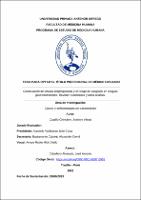Mostrar el registro sencillo del ítem
Continuación de terapia antiplaquetaria y el riesgo de sangrado en cirugías gastrointestinales. Revisión sistemática y Meta-análisis
| dc.contributor.advisor | Caballero Alvarado, José Antonio | |
| dc.contributor.author | Castillo Chinchay, Synthya Alessi | |
| dc.creator | Castillo Chinchay, Synthya Alessi | |
| dc.date.accessioned | 2023-09-15T20:52:42Z | |
| dc.date.available | 2023-09-15T20:52:42Z | |
| dc.date.issued | 2023 | |
| dc.identifier.uri | https://hdl.handle.net/20.500.12759/11175 | |
| dc.description.abstract | Los fármacos antiplaquetarios (APT) como la aspirina o el clopidogrel, son ampliamente utilizados para evitar eventos tromboembólicos. Tomar terapia con APT podría ocasionar problemas si una persona necesita una cirugía ya que podría generar sangrado, sin embargo, aún no está claro si los APT deben continuar o suspenderse temporalmente, por lo cual esta revisión analiza si la continuación de APT en cirugías gastrointestinales incrementa el riesgo de sangrado perioperatorio. OBJETIVO: Comparar el riesgo de hemorragia perioperatoria entre los pacientes con terapia antiplaquetaria continua y los que no tomaban medicación antiplaquetaria continua y se sometieron a una cirugía gastrointestinal. MATERIALES Y MÉTODOS: Se realizó una revisión sistemática y metaanálisis extraídos de 6 bases de datos mediante una estrategia de búsqueda. Tres autores realizaron la selección de estudios, extracción de información y evaluación del riesgo de sesgo de manera independiente. Se utilizaron herramientas como Risk of Bias 2.0 (RoB2) y ROBINS-I para evaluar los sesgos de las ECAs y cohortes respectivamente. RESULTADOS: Incluimos 2 ensayos clínicos aleatorizados (ECAs) y 8 cohortes. La media de pérdida sanguínea fue 18.35 menos para el grupo que continuó APT (MD - 18.35; IC 95% -31.90 a -4.80; p=0.008). El sangrado posoperatorio en el grupo que continuó APT fue 138 % mayor en comparación con el grupo sin terapia APT (RR 2.38; IC 95% 1.32 a 4.32; p=0.004). Hubo 0.96 días más de hospitalización en aquellos que continuaron APT respecto al grupo control. Los desenlaces de tiempo operatorio, transfusión sanguínea, re-operación, muerte intrahospitalaria y eventos tromboembólicos no fueron estadísticamente significativos. CONCLUSIONES: En general la interrupción de APT podría generar menor riesgo de sangrado. | es_PE |
| dc.description.abstract | INTRODUCTION: Antiplatelet drugs (APT) such as aspirin or clopidogrel are widely used to prevent thromboembolic events. Taking APT therapy could cause problems if a person needs surgery as it could lead to bleeding, however it is not yet clear whether APTs should be continued or temporarily stopped, so this review looks at whether continuing APT in gastrointestinal surgeries increases the risk of perioperative bleeding. OBJECTIVE: Our study aimed to compare the risk of intraoperative or postoperative bleeding between patients on continuous antiplatelet therapy and those not taking continuous antiplatelet medication and who underwent gastrointestinal surgery. MATERIALS AND METHODS: A systematic review and meta-analysis of randomized clinical trials (RCTs) and intervention cohorts, extracted from 6 databases using a search strategy, was performed. Three authors independently performed study selection, data extraction, and risk of bias assessment. Tools such as Risk of Bias 2.0 (RoB2) and ROBINS-I were used to assess the biases of the RCTs and cohorts respectively. RESULTS: We included 2 randomized clinical trials (RCTs) and 8 cohorts. Mean blood loss was 18.35 less for the group that continued APT (MD -18.35; 95% CI - 31.90 to -4.80; p=0.008). Postoperative bleeding in the group that continued APT was 138% greater compared to the group without APT therapy (RR 2.38; 95% CI 1.32 to 4.32; p=0.004). There were 0.96 more days of hospitalization in those who continued APT compared to the control group. The outcomes of operating time, blood transfusion, re-operation, in-hospital death, and thromboembolic events were not statistically significant. CONCLUSIONS: In general, the interruption of APT could generate a lower risk of bleeding.Antiplaquetarios | en_US |
| dc.description.uri | Tesis | es_PE |
| dc.format | application/pdf | es_PE |
| dc.language.iso | spa | es_PE |
| dc.publisher | Universidad Privada Antenor Orrego | es_PE |
| dc.relation.ispartofseries | T_MED_3563 | |
| dc.rights | info:eu-repo/semantics/openAccess | es_PE |
| dc.rights.uri | https://creativecommons.org/licenses/by/4.0/ | es_PE |
| dc.source | Universidad Privada Antenor Orrego | es_PE |
| dc.source | Repositorio Institucional - UPAO | es_PE |
| dc.subject | Antiplaquetarios | es_PE |
| dc.subject | Aspirina | es_PE |
| dc.title | Continuación de terapia antiplaquetaria y el riesgo de sangrado en cirugías gastrointestinales. Revisión sistemática y Meta-análisis | es_PE |
| dc.type | info:eu-repo/semantics/bachelorThesis | es_PE |
| thesis.degree.level | Título Profesional | es_PE |
| thesis.degree.grantor | Universidad Privada Antenor Orrego. Facultad de Medicina Humana | es_PE |
| thesis.degree.name | Médico Cirujano | es_PE |
| thesis.degree.discipline | Medicina Humana | es_PE |
| dc.subject.ocde | https://purl.org/pe-repo/ocde/ford#3.02.27 | es_PE |
| renati.advisor.orcid | https://orcid.org/0000-0001-8297-6901 | es_PE |
| renati.author.dni | 70971180 | |
| renati.advisor.dni | 18886226 | |
| renati.type | https://purl.org/pe-repo/renati/type#tesis | es_PE |
| renati.level | https://purl.org/pe-repo/renati/level#tituloProfesional | es_PE |
| renati.discipline | 912016 | es_PE |
| renati.juror | Acevedo Valdiviezo, Julio Cesar | |
| renati.juror | Bustamante Cabrejo, Alexander David | |
| renati.juror | Arroyo Rubio, Mick Daldo | |
| dc.publisher.country | PE | es_PE |
Ficheros en el ítem
Este ítem aparece en la(s) siguiente(s) colección(es)
-
Medicina Humana [2969]




